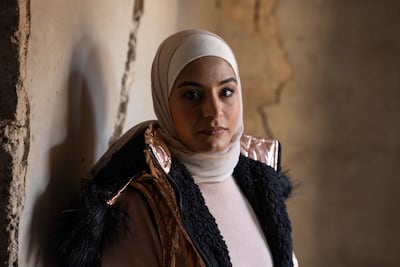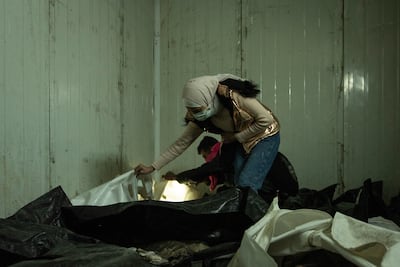Live updates: Follow the latest on Syria
Alaa Qasar’s father has a tattoo of his and his wife’s initials inscribed in a heart on his wrist: “A + M”. It’s the marker she hopes to use to identify his body as she moves between hospitals and mass graves in her search to find him.
But the corpses at the morgue of the Damascus Hospital, commonly known as Mujtahid, are mostly unidentifiable. Beneath the plastic bags – repeatedly opened and closed by families desperate to find their missing loved ones – they lie with blackened faces, bloated bodies and frozen expressions.
Slowly, Ms Qasar leans in to inspect the decaying corpses at Mujtahid, many hideously disfigured. A man, also searching for relatives in the morgue, runs out, gagging in disbelief and holding back tears.
But Ms Qasar sighs in relief: none were her father.
“I don’t want to see my father like this,” she told The National last week, on her second visit to Mujtahid. “But I don’t want my mum to go through this process, so I am doing it for her. I’m the eldest in the family and it’s my duty to be strong.”
After Syria’s long-held dictatorship was toppled by an armed rebel opposition on December 8, she has visited every hospital where the bodies of detainees were taken. But after more than a week of relentless effort, Ms Qasar has found no trace of her father. Still, she has vowed to keep looking “until I find proof of him, dead or alive”.
Like her, thousands of Syrians have flocked to hospitals, starting a painful journey of identifying missing loved ones among mutilated corpses – if they are lucky enough to find them.
“Our database records approximately 136,000 individuals who have been detained or forcibly disappeared [since 2011],” Fadel Abdulghany, director of the Syrian Network for Human Rights. “To date, I can confirm that around 31,000 of these individuals have been released.”
More than 105,000 Syrians remain unaccounted for in the wake of deposed President Bashar Al Assad's overthrow. According to the SNHR, these people were arbitrarily detained in the years since 2011, when Mr Al Assad's forces violently suppressed peaceful protests and plunged the country into a civil war.

Where are they?
Almost everyone in Damascus has a story of at least one missing relative.
“Where are they?” is a question Ms Qasar, Mr Abdulghany and thousands of family members of the missing have obsessively asked themselves.
A wall near the Mujtahid hospital is plastered with photos of dozens of faces hung by family members hoping for news of their loved ones. Passers-by carefully examine the gallery. “Please help us find Mahmoud Al Saleh from Raqqa,” reads one poster. “He may have amnesia. Contact the number if you have information.”
As Ms Qasar searched the morgue for her father, a man approached The National with a list of 18 names – all relatives who were arbitrarily detained. A morgue worker at another hospital, Al Mouwasat, said at least 50 people a day come to look for their missing relatives, although he said the hospital had never received any bodies from Syrian prisons.
“Drawing upon thousands of death certificates in our possession, along with our extensive monitoring of reopened prisons and communication with families, I can state with confidence that the majority of [detained and missing] individuals have tragically perished under torture,” Mr Abdulghany concluded.
Ms Qasar is under no illusion that her father is probably dead. He was arrested in 2012 at the age of 40 and accused by the regime of “communicating with terrorists”.
She said he was one of many victims of fabricated accusations, intended to sow fear among the population. “My father wasn’t talking to anyone. He would just go to work in the morning and come home in the evening. He wasn’t even participating in the demonstrations,” she said.
Moutaz was arrested after sneaking Ms Qasar and the rest of his family out of besieged Eastern Ghouta, an opposition stronghold under heavy bombardment where they had been living. The process involved passing through a number of checkpoints. “They interrogated him about how he managed to leave Eastern Ghouta and then released him,” she recalled. “But something felt off. When he came back [from the interrogation], he looked at us like he wanted to take pictures of our faces.”
The next day, security forces came for her father. She never saw him again.

'Painful process'
The family was later told he had been taken to the most feared of Mr Al Assad’s prisons, Sednaya, only 20km from Damascus and given the grim nickname of the “human slaughterhouse”.
When the rebels finally toppled the government, ending more than 50 years of Assad dynasty rule, they broke into the country’s notorious detention centres and freed tens of thousands of detainees. But as the prisons emptied of the living, it became evident that thousands of people's lives or deaths would remain without answers.
The National visited several Syrian prisons where thousands of documents lay scattered on the ground, with desperate families sifting through the strewn evidence, searching for a death certificate, a list of names – any clue that might provide the seed of an answer.
Ms Qasar found no trace of her father in Sednaya. His name, like those of many others, might be lost among the scattered documents somewhere in the prison's labyrinthine corridors.
Suhair Zakkout, spokeswoman for the International Red Cross in Damascus, said expectations should be managed for families, as answers “will not come tomorrow”.
“This is a painful and complex process,” she said. “We still have unresolved cases of missing people dating back to the Second World War. Identifications must be conducted carefully, step by step, to minimise the risk of losing evidence.”
Ms Qasar says she will not give up. “We will look for him until they say there’s no hope any more, maybe then we’ll hold a funeral. I want to be able to visit him.”
She has checked several hospitals, each time following social media rumours that another batch of bodies from prisons or military hospitals had been received. “They’ve told me to give my name and wait for updates, but I can’t just sit idly – I need to do something.”
A worker at Al Mouwasat told Ms Qasar bluntly her father was probably dead. “Where do I find the corpse, then?” she asked him.
The answer may lie in the many mass graves being uncovered throughout the country since the end Mr Al Assad’s reign. About 20 have been discovered throughout Syria already, Mr Abdulghany of the SNHR told The National.
If her father is buried in one of these, Ms Qasar's hope is to recognise a piece of clothing, as this time she won’t be able to look for the tattoo on the wrist. At the mass grave sites, the corpses – the few civil defence crews have been able to access so far, given their limited resources – have been reduced to skeletons.
Civil defence crews say they will be excavating mass graves and uncovering bodies for years to come.
